If you’re concerned about oral health, you may have some questions about teeth cleaning.
Like, what does a deep teeth cleaning at the dentist entail? What’s a scale and polish? And how much does dental cleaning cost?
These are all part of professional teeth cleaning with a dentist or hygienist, meant to remove tartar from teeth to combat gum disease and tooth decay. Teeth scaling is a common cleaning procedure, and often performed during routine cleanings. But if you’ve never had it before, the idea can be daunting.
If you have questions about dental procedures including teeth scaling and tooth polishing, or want to know how to remove tartar from teeth without visiting a dentist, you’re in the right place. In this article you’ll find information on:
- How much does a teeth cleaning cost?
- Tartar removal procedure, duration and what to expect
- How to make a hygienist appointment
- Whether it’s possible to remove tartar at home
- How to avoid tartar buildup on your teeth in the future
We hope this information on scaling teeth and removing tartar helps you make more informed choices about your dental care for better oral hygiene in the future.
What is tartar?
Dental tartar on teeth, or tooth calculus, forms when dental plaque is left to harden. Plaque builds up on your teeth throughout the day, and if not cleaned away, it soon solidifies to tartar. Tartar on teeth contains a mixture of calcium compounds, bacteria, and other organic matter naturally present in the mouth.
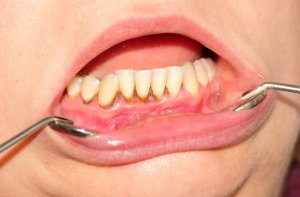
Unlike plaque, which is almost invisible, tartar is quite easy to spot. It ranges in color from white and yellow to brown and black, usually darkening the longer it remains. Tartar usually first accumulates around the gums and between teeth; the places that are hardest to clean properly.
Over time, tartar not removed from teeth can cause numerous problems including:
- Cavities
- Bad breath
- Gum disease
- Gum recession
- Teeth becoming loose or falling out
Not to mention, it’s pretty unpleasant to look at.
Because our teeth are uneven shapes and it’s hard to clean between them really well, some degree of tartar buildup on teeth is to be expected. However, with regular dental checkups your dentist can keep an eye on the condition of your teeth and recommend scaling teeth for tartar removal, if required.
This article about plaque explains more about what causes it and how to stop it building up and turning into tartar.
Tartar removal
If you struggle with plaque build-up, you’re probably wondering how to get rid of tartar. Calculus on teeth bonds very strongly to tooth enamel, so you can’t just scrape it off using your finger. Whereas brushing and flossing properly should remove most of the sticky plaque from your teeth, tartar removal requires special tools.
If your dentist or hygienist notices tartar on your teeth, they will conduct a professional teeth cleaning procedure called a scale and polish—more on that in a moment.
However, if you’re one of those people who wants to avoid visiting the dentists at all costs, you might be wondering how to remove calculus from teeth without going to the dentist. Are there ways to do it yourself? Can you remove tartar at home?
How to remove tartar from teeth without a dentist
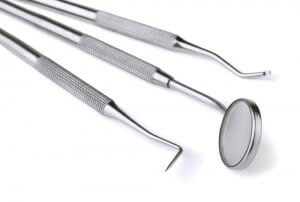
The short answer is, don’t try to conduct your own teeth scaling at home.
As you’ll see below, dentists and hygienists use a range of specialist tools to get rid of tartar on teeth. Although you can buy tartar removal tools online, just like dental professionals use for teeth scaling, there is a big risk of damaging the teeth and gums if these tools are used without the proper training.
It’s also very hard to see inside your own mouth in the same way that a dentist can, to check that all the tartar buildup is removed.
However, now there are tools — ultrasonic tooth cleaners — that are available for at home use. They make tartar removal at home safer, because they don’t require a scraping action. Additionally, some come with a camera, so you can see how and where you are cleaning. You can read our ultrasonic tooth cleaner review to find out more.
If you are trying to avoid dentist cleaning costs by removing tartar at home, it’s a much better idea to find dental financing options.
Natural tartar removal at home
But are there any natural ways to carry out tartar removal at home? Can you remove tartar from teeth with baking soda, activated charcoal or other natural products?
Unfortunately for those hoping to remove tartar from teeth without a dentist, the answer is again ‘no’. There are lots of natural ways to remove plaque—you could try making your own natural toothpaste, for example—but once tartar has accumulated, the only safe way to properly remove it is with professional teeth cleaning and teeth scaling at the dentist. You simply can’t remove tartar at home.
Now, let’s look at exactly what’s involved with tooth scaling and polishing.
What is dental scaling?
So how do dentists remove tartar? Well, there are two parts to this common tartar removal and teeth cleaning procedure, which may be carried out by a dentist or hygienist.
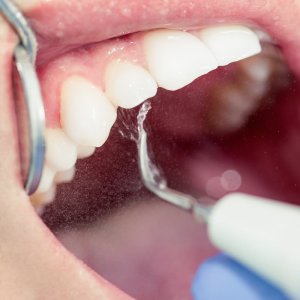
- Teeth scaling: The first task is to clean by scraping plaque off of teeth. Various tartar removal tools are used for teeth scaling, which we describe in more detail below.
- Teeth polishing: Once teeth are clean, they are polished to make the surface really smooth. Not only does this improve the cosmetic appearance of the teeth; it also removes rough patches which are more susceptible to plaque buildup.
Depending on the state of your oral health, your dentist or hygienist will either conduct a regular tooth cleaning, potentially with a scale and polish as and when is needed, or they may recommend a deep cleaning (more on that later.)
Now let’s look in detail at what a dentist or hygienist does when scaling teeth during dental cleaning.
After the tooth surface has been completely cleaned above and below the gum line, the root of the tooth undergoes a process called planing. This is a process of smoothing the root of the tooth so that any remaining tartar is removed. This clears away any rough areas that bacteria below the gum line thrive in. And, it makes it much easier for the gum tissue to re-attach itself to the tooth, reducing the size of the pockets that the plaque and bacteria hide in.
Scaling occurs above or below the gum line and involves the scraping and removal of plaque and calculus (tartar) from the tooth. Scaling done at regular teeth cleanings usually involves the crown of the tooth. However, in more extreme circumstances, it is necessary to go further below the gum line to thoroughly remove disease-causing bacteria and its by-products on the root surface. The goal of root planing and scaling is to prevent or treat gum disease and to keep your mouth as healthy as it can be.
Dr. Angela Evanson, Angela Evanson DDS
Dental cleaning procedure
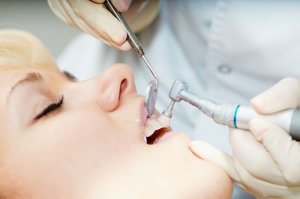
When scaling teeth, dentists normally use an electric scaling instrument, sometimes called an ultrasonic scaler. This vibrates at high speeds to loosen tartar on the teeth. It also sprays water to wash the debris away, so you might be asked to spit from time to time.
Once the electronic scaler has removed larger pieces of tartar on teeth, the dentist will use hand scaling tools in a variety of shapes and sizes. They scrape away any remaining tartar, with the different shaped tools making it possible to reach between the teeth and into gum pockets.
Any newly exposed areas of tooth enamel can be quite rough, but the final polish takes care of this. The dental polishing tool looks a bit like a rotating electric toothbrush head, and the dentist might use a special toothpaste to finish the dental cleaning.
Heavy tartar removal
If you haven’t taken the best care of your teeth and have avoided the dentist for years, you may have quite heavy tartar buildup. In extreme cases, tartar on teeth can spread to the point where it completely covers the teeth (here is one example, if you’re interested). Even if heavy tartar removal is required, it’s possible to save the teeth underneath once the tartar removal is complete.
The process is much the same as described above, but will take longer the more calculus on teeth has built up.
The video below shows how dental tools are used to remove tartar from teeth, even when it’s been there a while.
What is a deep cleaning?
Many people get confused with the various types of teeth cleaning out there. We just finished talking about scaling and polishing, which is a pretty routine procedure that many dentists encourage their patients get once or twice a year in order to prevent periodontal disease.
A deep cleaning of the teeth, however, is a bit more involved and is meant for those patients who already have periodontal disease. If you already have periodontal disease and deep gum pockets, your dentist may recommend not only scaling teeth but a deep cleaning that includes root planing as well. You can read our article dedicated to deep cleaning to find out more. Meanwhile, have a look at the table below that shows the difference between a regular cleaning and a deep cleaning.
| | Routine cleaning | Deep cleaning |
| What is involved? | A routine cleaning can just be a simple brushing and flossing, but your dentist may also scale and polish your teeth as well. | A deep cleaning involves root planing. This is done after extensive scaling, so that your gums can adhere to the roots again. |
| Who is it for? | For everyone! Meant to prevent periodontal disease. | For those who already have periodontal disease. |
| How long does it take? | Less than an hour. | Can take muiltiple hours, depending on the severity of tartar buildup. |
| Does it hurt? | Not too much, teeth and gums may be a bit sore afterwards. | You may experience quiete a bit of soreness for a few days after the procedure. |
How long does a dental cleaning take?
A scale and polish for someone who has generally good oral hygiene might take around 15-30 minutes, with the entire hygienist appointment lasting 30-45 minutes.
When more extensive tartar removal is required, it can take a lot longer—even hours—and may be spread over more than one appointment. Patients who are nervous about the procedure can request for it to be done under IV sedation. With this, the patient is awake throughout but very relaxed, and won’t remember much of the teeth cleaning experience. However, IV sedation usually has to be paid for privately.
Does dental cleaning hurt?
Scaling teeth during a routine cleaning can be uncomfortable, but it shouldn’t be painful if you have done a good job of removing plaque by cleaning your teeth daily.
If, however, calculus on teeth has built up around your gums and below the gumline, the calculus removal will probably hurt a bit. This is partly because of the effort required to scrape tartar away, and partly because the gums underneath will be sore anyway. Your dentist might apply an anesthetic gel to your gums to help with the pain, or may even use a local anesthetic if the procedure is going to be quite invasive.
After a scale and polish, you might experience some tooth sensitivity while your teeth adjust to being fully exposed again, but they shouldn’t be painful for more than a couple of days.
Does a scale and polish whiten your teeth?
Dental scaling and polishing removes surface stains from teeth, so it can make them appear brighter and whiter even though there is no teeth whitening involved. You should also notice that they feel much cleaner.
Tooth scaling before and after

This image shows teeth before and after a scale and polish with a hygienist. As you can see, a lot of tartar buildup has been removed and the teeth have a brighter appearance after a dental scaling and polishing.
However, the gums which were covered with calculus have become red and inflamed, so this patient will experience some soreness while the gums recover.
What else to expect at a dental cleaning visit
A hygienist appointment isn’t just about removing tartar from your teeth. Dental hygienists will also check your general oral hygiene and show you the best way to clean your teeth, as well as addressing any concerns you have.
They may finish by applying a fluoride varnish to protect your teeth, as the video below explains.
Your dentist may also recommend a dental sealant, which can help keep molars with deep fissures free from cavities. You can read more about sealants for children in our full guide.
How much does a dental cleaning cost?
Now that you’re ready for a professionally clean mouth, you’re probably wondering just how much is teeth cleaning at the dentist anyway? Teeth cleaning costs vary depending on whether you have insurance or not, who your dentist is, and where they are located. Additionally, teeth cleaning costs more if extensive dental scaling is needed.
Cost of dental cleaning with insurance
How much does it cost to get teeth cleaned on insurance? If you purchase a dental insurance plan, it’s likely that your plan will cover 100% of dental cleaning costs for preventative visits once a year. If you have Medicaid, dental coverage is decided by state, so it’s possible that in your state Medicaid will not cover your dental expenses.
Dental cleaning cost without insurance
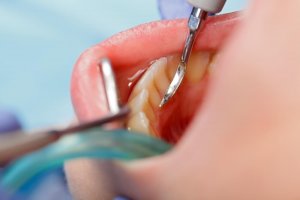
So how much does a teeth cleaning cost without insurance? The cost of dental cleaning that includes a basic scale and polish with a private dental hygienist costs between $75 and $200, but expect hygienist prices to be higher for more advanced or complex treatments. Some hygienists offer stain removal treatments, for example. Dental deep cleaning might be charged per quadrant, meaning you only pay for it in the areas where it’s needed.
Some dental insurance policies and private dental plans include preventative care like teeth cleaning as standard. This can be a helpful way to spread the cost of basic dental care if you know you’ll need regular hygiene appointments.
Additionally, there are quite a few charitable organizations and dental schools that offer reduced cost or free teeth cleanings. Check out our article on Medicaid and low-cost dental care to find out more.
How often should you get your teeth cleaned?
First of all, check with your dentist how often you should receive a scale and polish. You don’t necessarily need to visit a hygienist as often as you get regular checkups, unless you have particular oral health problems that need special attention.
Research from Cochrane studied adults with healthy gums who got a scale and polish every six months, every 12 months, and not at all over a period of three years. The conclusion was that there was almost no difference in bleeding gums (one of the signs of gum disease) between the three groups, suggesting that there is little benefit to routine scaling and polishing. However, this study didn’t include adults who already had bleeding gums or some other sign of gum disease, so this doesn’t negate the need to get checked regularly.
How to find a dental hygienist near me
Your local dental clinic will most certainly have a hygienist on staff. However, you can also call 866-383-0748, where you will be connected with a dental clinic in your area. All you have to do is make an appointment for a dental checkup and cleaning. You can read our guide on how to find a dental hygienist near you.
How to clean your own teeth like a hygienist
The best way to avoid painful tartar removal during a teeth cleaning at the dentist is to prevent tartar buildup in the first place. Following a thorough daily oral hygiene routine will help keep your teeth free from plaque, the biofilm which turns into tartar if it’s left for long enough. We recommend you read our guide to brushing teeth for full details, but here are some basic steps you can take:
- Brush for at least two minutes, twice a day—one of those times being before bedtime
- Use a manual or electric toothbrush with soft bristles
- Hold the brush at a 45-degree angle so the bristles reach below the gumline
- Take care to brush all surfaces of each tooth
- Clean between teeth with dental floss or a water flosser
- Spit but don’t rinse right after brushing; the ingredients in your toothpaste need to stay on your teeth for a while.
Even taking this special care to keep your teeth clean, tartar on teeth can still build up in hard-to-reach places. It’s important to have regular dental checkups so your dentist can check the condition of your teeth and refer you for a scale and polish to remove tartar if necessary.
FAQs
How much is a dental cleaning without insurance?
A routine dentist cleaning cost can be anywhere between $75 and $200, but this doesn’t include the cost of anesthetics if you need them due to particularly sensitive teeth.
How do you remove calculus from your teeth?
First of all, if you’re wondering how to remove calculus from teeth at home, calculus removal is something that must be done at the dentist. There is no safe procedure for removing tartar at home. Your dentist, on the other hand, will remove calculus either by using a small metal hook-like tool called a curette, or a more modern ultrasonic scaler. Using these tools, your dentist will scrape the tartar off of your teeth around and below the gum line.

How can you remove calculus from teeth without going to the dentist?
If you’re wondering how to remove tartar at home, forget it! As mentioned above, removing tartar at home just isn’t possible to safely achieve. Make sure to visit a dentist once or twice a year. That way if you have tartar that you need removed, your dentist can make sure that gets done.
How do you remove tartar from the backs of teeth?
Getting rid of tartar on teeth backs is something that your dentist will have to do for you. They will use a curette or an ultrasonic scaler to remove tartar from the back of your teeth. That being said, much of your preventative care will take place at home. To prevent tartar buildup in the first place, you should make sure to have a proper brushing and flossing routine.
Will my teeth hurt after a cleaning?
After a routine dental scaling and polishing, you may find that your teeth and gums are a bit sore. If you experience some tooth sensitivity after a cleaning you can take over-the-counter pain meds. Ibuprofen or acetaminophen can help relieve pain. You can also try using a toothpaste made for sensitive teeth.
How long does a teeth cleaning take?
If you have relatively healthy teeth, a routine cleaning shouldn’t take more than 15 to 30 minutes, with the whole appointment lasting no longer than 45 minutes. If you require more extensive scaling, your cleaning may take hours, or even be spread over days.
Where can I find a dental hygienist near me?
You can call your nearest dental clinic to find a hygienist close by. Or you can call 866-383-0748 to make an appointment for a cleaning at a clinic in your area.
Cochrane UK: Scale and polish? Shining a light on routine dental care. Consulted 3 October 2019.
Oral Health Foundation: Preventive care and oral hygiene. Consulted 3 October 2019.
Cochrane UK: Scale and polish? Shining a light on routine dental care. Consulted 3 October 2019.
Oral Health Foundation: Preventive care and oral hygiene. Consulted 3 October 2019.




